written by Andrew Lee
Happy New Year! And welcome to the Eighth Day of Christmas, when we remember the circumcision and naming of Jesus by celebrating the Feast of the Holy Name. As the end of today’s Gospel reading tells us, Mary and Joseph, in keeping with God’s covenant with Abraham, circumcised Jesus on the eighth day after his birth, and named him Jesus, as the angel had commanded.
While the Feast of the Holy Name celebrates the naming of Jesus, it echoes the Holy Name first revealed to Moses in Exodus chapter three. When Moses asks for God’s name, he receives this enigmatic response: יהוה, that is, “I am who I am.” The ensuing dialogue between God and Moses—as well as the rest of the Old Testament—treats this notoriously difficult-to-translate word as God’s actual name. Moreover, in deference to the commandment to keep God’s name holy, Jewish tradition to this day avoids the pronunciation of this word, using, among other terms, HaShem (The Name) as a placeholder reference instead.
This deep reverence for The Name endures despite the riddles it presents. Is I am who I am, which could also be translated as I will be who I will be, a direct answer to Moses’s question, a revelation of the way that God actually names God’s self? Or is it, as indeed it sounds, an evasion, a bit of wordplay that suggests God’s name is ultimately unknowable or unutterable—beyond human grasp?
With this swirl of awe and puzzlement as background, we come to the Feast of the Holy Name. And this time, the divine revelation is not the mysterious I am who I am, but the assurance of “Jesus,” which in Hebrew is “I am who I am saves.” Beyond our understanding God may be, but the baby being circumcised and named is direct evidence that God is directly and personally invested in the project of liberating us.
And that Jesus is named as part of the rite of circumcision is significant. It reminds us of a very particular set of circumstances: I am who I am saves by being born into an oppressed religious minority, under the boot of foreign occupation, to a modest family in a small town on the hinterlands of the Empire. Indeed, on the Feast of the Holy Name we celebrate that I am who I am became not only one of us, but one of the most marginalized and unfortunate of us. It was a strikingly difficult way for the Unsayable to make The Name known to us in a way that conveyed not only identity, but more critically solidarity and help. From a position of powerlessness, from a place of weakness, with great humility, I am who I am saves.
As we begin a new year and a new decade, let us who are called by his name, the people of the Jesus movement, not only celebrate but live the feast of the Holy Name. Let us go out to the margins and the back alleys and declare to the powerless and forgotten that God is not distant and unknowable. God has drawn near and made known God’s self to us. God has revealed God’s self as the one freeing us from our despair and forming all of us into God’s own people. Jesus has come to welcome us all into the power and privileges of the Holy Name.
Artwork: Circumcision of Jesus and Presentation in the temple from the Vanderbilt Divinity Library
Andrew K. Lee is a PhD student in Christian Spirituality at the Graduate Theological Union in Berkeley, CA, and a past president of the Standing Committee of the Diocese of California. Along with his academic and church work, he also leads contemplative workshops and retreats.

